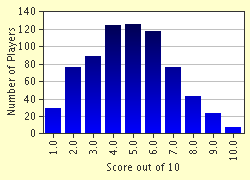Quiz Answer Key and Fun Facts
1. What was the collective name to describe the ports of Hastings, Romney, Hythe, Dover, and Sandwich?
2. Under whose reign was the Court of Star Chamber first given its role as a powerful judicial body separate from the King's Council, with a mandate to hear petitions of redress?
3. Which of these English Kings signed the Magna Carta?
4. How did Judge Jeffreys earn himself his bad reputation?
5. Which of these Parliaments came first in history?
6. What situation during the reign of Queen Victoria was described as "the Bedchamber Crisis"?
7. Which of these was (or were) organised in support of the coal-miners?
8. What is meant by the "Peterloo Massacre"?
9. Who - at least indirectly - caused the British Expeditionary Force to call themselves "the Old Contemptibles"?
10. What did the Act of Settlement "settle"?
Source: Author
flem-ish
This quiz was reviewed by FunTrivia editor
bloomsby before going online.
Any errors found in FunTrivia content are routinely corrected through our feedback system.

